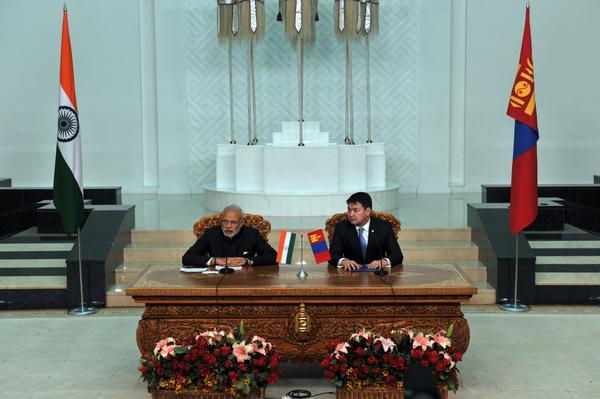Indian Prime Minister Narendra Modi visited Mongolia on 17th May making him the first ever prime minister in history to do so. His visit to this sandwich nation is a part of the three nation visit which includes the high profile visit of China and South Korea. Usually Mongolia does not figure on the itinerary of most world leaders. However, Modi wants to convey the message that India has an extended foreign policy with proper strategic agenda.
The background
The historical interaction between India and Mongolia has been for over 2500 years. India established formal diplomatic relations with Mongolia on December 24, 1955 hence becoming the first country outside the Soviet bloc to establish diplomatic relations with the country. Since then, there have been numerous diplomatic visits and interactions between the two countries like the joint declaration of 1973 and the Treaty of friendly relation and cooperation in 1994.
India featured importantly in Mongolian “third neighbour” policy which seeks to establish ties with key western and eastern nations. Since the establishing of relations in the 1955, 30 agreements have been signed between the two nations that build upon historical and cultural relations that existed between the two nations.
India has been playing a key role in modernizing the Mongolian defence. India and Mongolia signed a defence cooperation agreement, which included the conduct of joint defence exercises code-named “Nomadic Elephant”. India is also an active participant in an annual week-long joint training exercise called the “Khaan Quest”, hosted by Mongolia.
India and Mongolia are culturally inseparable and they have common Buddhist heritage to share. Today, Buddhists form the single largest religious denomination in Mongolia. A Mongolian-run Buddhist monastery was established in the historic city of Bodh Gaya in Bihar and its foundation stone was laid by Enkhbayar.
The Visit
Today, Indo-Mongolian relations have been growing ever since and is entering into a “new age of trust and mutual cooperation”. Mongolia has been vocal since a long time regarding the permanent membership of India in the United Nations Security Council and for a reformed structure of the same. India provides technical and economic cooperation to Mongolia in the fields of higher education, agriculture, information and communication technology, and human resource development.
Mongolia has been a friendly nation for India. It’s never too late to show your relation-building measures, and Modi’s visit will surely foster the bond between the two nations. Modi wants to power up a 10000 MW nuclear project and for that India needs a constant supply of uranium which he can get from Mongolia. In 2009, Mongolia was among the first to sign a uranium deal with India. However, India has not yet received any uranium supplies from Mongolia. The key agenda is likely increased bilateral cooperation in areas like defence and security, trade, and civilian nuclear energy.
Modi will also carry an education gift for Mongolia. Mongolia has requested India to help set up a secondary school in its capital to feed the growing demand for English in a country where Russian and Chinese were for decades the only major foreign languages learned by the local population.
Mongolia is also considered as one of the world’s most mineral-rich countries with large coal, petroleum and uranium reserves. Recently Indian companies have started venturing into Mongolia, seeking to tap the vast potential. Indian steel maker SAIL has already entered a joint venture with the Mongolian government in 2012 to establish iron ore and coal mines in the country. Hence this visit will surely benefit India both economically and strategically.

